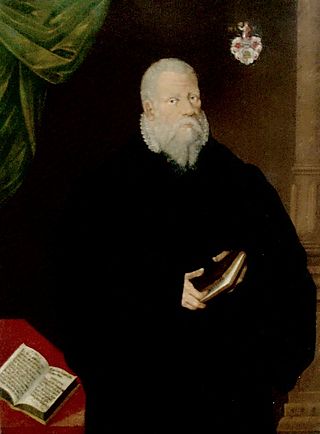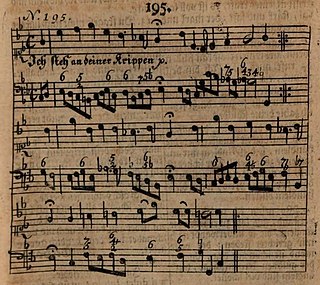
Psalm 147 is the 147th psalm of the Book of Psalms, beginning in English in the King James Version, "Praise ye the LORD: for it is good to sing praises". In the slightly different numbering system used in the Greek Septuagint version of the Bible, and in the Latin Vulgate/Vulgata Clementina, this psalm is divided into Psalm 146 and Psalm 147. In Latin, Psalm 146 is known as "Laudate Dominum quoniam bonum psalmus", and Psalm 147 as "Lauda Jerusalem Dominum".
David Denicke was a German jurist and hymn writer.

Gottfried Vopelius, was a German Lutheran academic and hymn-writer, mainly active in Leipzig. He was born in Herwigsdorf, now a district of Rosenbach, Oberlausitz, and died in Leipzig at the age of 70.

Schemellis Gesangbuch is the common name of a collection of sacred songs titled Musicalisches Gesang-Buch published in Leipzig in 1736 by Georg Christian Schemelli, to which Johann Sebastian Bach contributed.

"Allein Gott in der Höh sei Ehr" is an early Lutheran hymn, with text and melody attributed to Nikolaus Decius. With the reformers intending church service in German, it was intended as a German version of the Gloria part of the Latin mass, used in almost every service. Decius wrote three stanzas, probably in 1523, while a fourth was added, probably by Joachim Slüter.
"Der Geist des Herrn erfüllt das All" is a Christian hymn for Pentecost by Maria Luise Thurmair, written in 1941. First printed in 1946, it appeared with a 1609 melody by Melchior Vulpius in the German Catholic hymnal Gotteslob in 1975 as GL 249. It has been included in ecumenical hymnals and songbooks.

"Nun lasst uns Gott dem Herren" is a Lutheran hymn of 1575 with words by Ludwig Helmbold. It is a song of thanks, with the incipit: "Nun lasst uns Gott dem Herren Dank sagen und ihn ehren". The melody, Zahn No. 159, was published by Nikolaus Selnecker in 1587. The song appears in modern German hymnals, including in the Protestant Evangelisches Gesangbuch as EG 320.

"Nun danket all und bringet Ehr" is a German Lutheran hymn in nine stanzas, with a text written by Paul Gerhardt. It was first published in 1647, in Johann Crüger's Praxis pietatis melica which was the first publication of hymns by Gerhardt. In the 1653 edition, Crüger added a melody that he composed. As a general song of thanks, the song has appeared in several hymnals, including the German Protestant hymnal Evangelisches Gesangbuch and the Catholic hymnal Gotteslob. It has inspired musical settings by composers from the 17th to the 21st century. Johann Sebastian Bach used the first stanza in a cantata, however with the melody of "Lobt Gott, ihr Christen alle gleich", Hugo Distler composed a chorale cantata, and Günter Berger based a toccata for organ on it.

"Fröhlich soll mein Herze springen" is a Christian Christmas hymn by Paul Gerhardt, originally in 15 stanzas in artful metre. It was first published, "Frölich sol mein hertze springen", in 1653 in the fifth edition of the hymnal Praxis Pietatis Melica by Johann Crüger, who also created a melody. Johann Sebastian Bach used it as a chorale in his Christmas Oratorio, with a different melody by Johann Georg Ebeling. The song is part, with twelve stanzas, of the current Protestant hymnal Evangelisches Gesangbuch and other songbooks.
"Auf meinen lieben Gott" is a Lutheran hymn from the 17th century. Several hymns are sung to the same hymn tune, including "Wo soll ich fliehen hin", and it was set in compositions. The hymn was translated into English as "In God, My Faithful God". It is part of modern hymnals and songbooks.

"Ich steh an deiner Krippen hier" is a German Christmas hymn, with lyrics by Paul Gerhardt which were first published in 1653. It was then sung with an older melody by Martin Luther, but a melody which was likely created by Johann Sebastian Bach for Schemellis Gesangbuch of 1736 is now part of current Protestant and Catholic hymnals.
"Nun jauchzt dem Herren, alle Welt" is a German Christian hymn, a paraphrase of Psalm 100. The text was written by David Denicke, based on a metered paraphrase of the psalm from the Becker Psalter, and published in his 1646 hymnal. The song appears in modern German-language hymnals, such as the Protestant Evangelisches Gesangbuch and the Catholic Gotteslob. With a joyful melody derived from a 14th-century model, it is one of the most popular psalm songs in German.
"Aus der Tiefen rufe ich, Herr, zu dir" is a German hymn with a text by Georg Christoph Schwämlein. The opening lines of the hymn stay close to those of Psalm 130, while most stanzas of the hymn are written from a Christian perspective. It was first published, with its own hymn tune, in the Nürnberg hymnal of 1676. Gottfried Vopelius published it with a new hymn tune in the 1682 Neu Leipziger Gesangbuch, p. 936. From 1699 to 1738 the hymn was published with four more new melodies.
"Singt dem Herrn ein neues Lied" is a Christian hymn in German. It was written by Georg Alfred Kempf, a Protestant pastor in Alsace, in 1941. With a 1956 melody by Adolf Lohmann, it is part of the common German Catholic hymnal Gotteslob (2013).
"Nun singt ein neues Lied dem Herren" is a Christian hymn with German text by Georg Thurmair. He based it on Psalm 98 and wrote it in 1967 to match a traditional 16th-century melody. The song is part of German hymnals, including Gotteslob, and songbooks.
"Lasst uns Gott, dem Herrn, lobsingen" is a Christian hymn in German with text by Petronia Steiner written in 1944 to a melody that Johann Georg Ebeling created in 1666 for a hymn by Paul Gerhardt. It is contained in regional sections of the Catholic hymnal Gotteslob.
"Ein Danklied sei dem Herrn" is a Christian hymn with German text written by Guido Maria Dreves in 1886, and a melody written by Josef Venantius von Wöss in 1928. It is a song of thanks and praise of God who protects the people he created. The song appeared as part of the Catholic Gotteslob.
"Dir, dir, Jehova, will ich singen" is a Lutheran hymn, with 1695 text by Bartholomäus Crasselius. A melody attributed to Johann Sebastian Bach appeared in Schemellis Gesangbuch. It was translated into English by Catherine Winkworth in 1863 as "Jehovah, let me now adore Thee". The song became part of many German hymnals, such as Evangelisches Gesangbuch and Gotteslob. From the 1930s, the hymn has often been rendered as "Dir, dir, o Höchster, will ich singen".
"Kommt herbei, singt dem Herrn" is a Christian hymn with text by Diethard Zils in 1972, a paraphrase of Psalm 95 to an Israeli melody. It is of the genre Neues Geistliches Lied (NGL), published in 1972. In the 2013 Catholic hymnal Gotteslob, it appears as GL 140. It is also contained in other hymnals and songbooks.
"Lobet und preiset, ihr Völker, den Herrn" is a round for three parts to a German text based on three psalms. The melody has been passed orally. The round, a general expression of praise, is part of many hymnals and songbooks, and used for many occasions. It is easy and also suitable for children and young adults.








